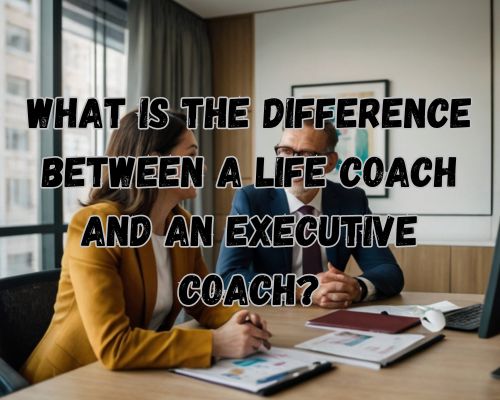Is there a difference between a life coach and an executive coach? The answer is yes, and it’s more nuanced than you might think.
Life coaching focuses on your personal development and well-being. It helps you achieve goals related to self-awareness, relationships, and health.

Executive coaching like what Make It Happen Coaching does, on the other hand, hones in on professional growth. It enhances leadership capabilities and facilitates career advancements.
The critical difference lies in the realm each type of coaching primarily serves: life coaches guide personal transformation, whereas executive coaches target professional excellence.
You might wonder how these distinctions translate into practice.
Life coaches often assist you in identifying personal ambitions and removing obstacles that prevent you from living a fulfilling life. They emphasize emotional well-being and personal satisfaction.
In contrast, executive coaches evaluate your professional actions and strategies. They provide insights into how you can improve your professional performance and ascend the career ladder.
If you’re contemplating which type of coaching suits your needs, consider your current challenges and aspirations.
Are you looking to improve your personal life and achieve a sense of balance and well-being? Or are you more focused on climbing the corporate ladder and developing specific professional skills?
Understanding these fundamental differences can help you make an informed choice and get the most out of your coaching experience.
Understanding Executive Coaching
Executive coaching centers around enhancing leadership skills and driving professional development. It involves working closely with business leaders to improve performance and manage teams effectively.
Role of an Executive Coach
An executive coach partners with clients to strengthen their leadership capabilities.
They help clients identify strengths and weaknesses by focusing on observable actions and behaviors. Through regular sessions, they provide specific feedback and actionable insights. This tailored support helps executives adopt better management practices and enhance overall performance.
Focus Areas in Executive Coaching
The primary focus areas in executive coaching include leadership development, strategic planning, and emotional intelligence.
- Leadership Development: Coaching helps improve decision-making and inspire teams.
- Strategic Planning: Coaches assist in setting and achieving long-term goals.
- Emotional Intelligence: Developing self-awareness and empathy to foster better workplace relationships.
Executive Coaching in the Professional Sphere
Executive coaching is pivotal in the corporate world.
It supports leaders in navigating complex organizational challenges and achieving business goals. By focusing on both personal and professional growth, coaches empower executives to excel in their roles. This fosters a culture of continuous improvement and high performance within the company.
Comparing with Life Coaching
Understanding the distinctions between life coaching and executive coaching can help you make an informed decision based on your specific needs.
While life coaches focus on personal development and enhancing well-being, executive coaches target professional growth and leadership skills.
What Life Coaches Offer
Life coaches like what Make It Happen Coaching also does, specialize in personal goals and improvement. They help individuals navigate their personal lives by setting and achieving goals related to wellness, work-life balance, and improving relationships.
Typical services include:
- Wellness coaching to promote healthy habits
- Self-awareness exercises to understand personal strengths and weaknesses
- Goal setting strategies for life ambitions
Life coaches often serve clients who are looking to better understand themselves and improve their overall quality of life.
Personal vs. Professional Coaching Dynamics
Personal development is the main area where life coaches operate. They assist in areas outside of the professional realm, focusing on issues like emotional well-being, personal satisfaction, and relationship building.
Executive coaches, in contrast, are primarily concerned with professional growth.
They often work with leaders and managers to develop skills like emotional intelligence, strategic thinking, and leadership abilities.
Key Differences:
- Focus: Personal life vs. Professional development
- Clientele: Individuals seeking personal fulfillment vs. executives and leaders
- Approach: Holistic and emotionally-centered vs. goal-oriented and performance-based
Selecting a Coaching Service Based on Needs
Choosing between a life coach and an executive coach depends on what you aim to achieve.
If you are looking to improve your personal life, align your activities with your values, or enhance your emotional well-being, a life coach could be ideal.
For professional aspirations, such as enhancing leadership skills, navigating career transitions, or improving team dynamics, an executive coach is more suitable.
Factors to consider:
- Your Goals: Personal vs. Professional
- Type of Support Needed: Emotional vs. Strategic
- Desired Outcomes: Personal well-being vs. Career advancement
Assess your goals and needs to select the coaching service that aligns best with your life or career objectives.